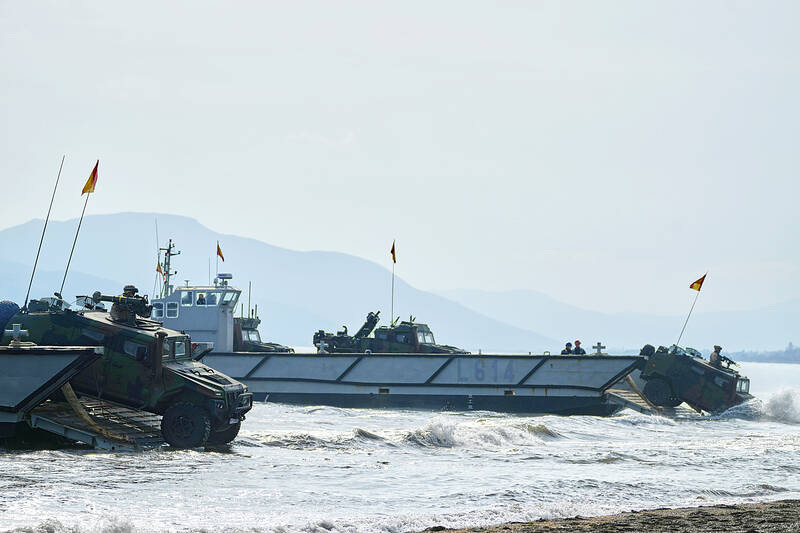NATO is testing its ability to rapidly deploy across eastern Europe — without direct US assistance — as Washington shifts its approach toward European defense and the war in Ukraine.
The six-week Steadfast Dart 2025 exercises across Bulgaria, Romania and Greece are taking place as Russia’s invasion of Ukraine approaches the three-year mark. They involve about 10,000 troops from nine nations and represent the largest NATO operation planned this year.
The US absence from the exercises comes as European nations scramble to build greater military self-sufficiency over their concerns about the commitment of US President Donald Trump’s administration to common defense and demands for increased European military spending.

Photo: AP
Trump on Wednesday announced his intention to negotiate with Russia directly, and US Secretary of Defense Pete Hegseth said at his first meeting with NATO colleagues in Brussels that day that European nations should dramatically increase their defense spending and shoulder the “overwhelming share” of funding for Ukraine.
Greek and Spanish marines led Thursday’s military demonstration, an amphibious assault near the central Greek city of Volos, in the first full-scale operational deployment of NATO’s new Allied Reaction Force (ARF).
Established in July last year, the force represents NATO’s latest strategic evolution, designed to deploy at scale within 10 days and combining conventional forces with cyber and space-based technologies.
“This is what we’ve been training for,” the ARF’s commander, Italian Lieutenant General Lorenzo D’Addario, said after the 90-minute demonstration.
“The thinking is that NATO wanted to have a force that is ready, that is flexible, that can operate across the five domains — air, sea, land, but indeed cyber and space — in a way that ensures it answers the [needs] of defending the alliance, but also deterring” conflict, he said.
Western military officials — anticipating lasting tension with Russia and President Vladimir Putin, possibly beyond the Ukraine conflict — argue that NATO’s new capability is becoming increasingly important to reinforce its eastern flank.
“As we soon approach the anniversary of Russia’s brutal invasion of Ukraine, we see today a revitalized and refocused NATO,” said Canadian Lieutenant General Peter Scott, the deputy commander of NATO’s Joint Force Command in Naples, Italy, who also attended the exercise.
He described the exercise as “a significant milestone, an accomplishment in the modernization and expansion of NATO’s readiness to defend every inch of allied territory.”
Scott said preparations for the exercise started two years ago and followed cooperation with planners from non-participating countries, including the United States.
“But in future exercises, there’ll be a different make up of countries that are going to participate. But purely for this one, that’s just the way it rolls out,” he said.
The current exercise involves forces from nine NATO members, including regional rivals Greece and Turkey, deploying 17 naval vessels, more than 20 aircraft and over 1,500 military vehicles. Britain leads the operation with 2,600 military personnel and 730 vehicles, assuming command of all land forces during the drills.
The drills, which end on Feb. 26, focus on rapid deployment scenarios and multidomain operations across air, land, sea and special forces, underscoring NATO’s shifting military posture along its eastern boundaries.
Participating nations are Bulgaria, France, Greece, Italy, Romania, Slovenia, Spain, Turkey and the UK. Earlier this week, communist-backed groups staged small protests near the training area in central Greece, opposing the country’s involvement in overseas deployments.

DEADLOCK: Putin has vowed to continue fighting unless Ukraine cedes more land, while talks have been paused with no immediate results expected, the Kremlin said Russia on Friday said that peace talks with Kyiv were on “pause” as Ukrainian President Volodymyr Zelenskiy warned that Russian President Vladimir Putin still wanted to capture the whole of Ukraine. Meanwhile, US President Donald Trump said that he was running out of patience with Putin, and the NATO alliance said it would bolster its eastern front after Russian drones were shot down in Polish airspace this week. The latest blow to faltering diplomacy came as Russia’s army staged major military drills with its key ally Belarus. Despite Trump forcing the warring sides to hold direct talks and hosting Putin in Alaska, there

North Korea has executed people for watching or distributing foreign television shows, including popular South Korean dramas, as part of an intensifying crackdown on personal freedoms, a UN human rights report said on Friday. Surveillance has grown more pervasive since 2014 with the help of new technologies, while punishments have become harsher — including the introduction of the death penalty for offences such as sharing foreign TV dramas, the report said. The curbs make North Korea the most restrictive country in the world, said the 14-page UN report, which was based on interviews with more than 300 witnesses and victims who had

COMFORT WOMEN CLASH: Japan has strongly rejected South Korean court rulings ordering the government to provide reparations to Korean victims of sexual slavery The Japanese government yesterday defended its stance on wartime sexual slavery and described South Korean court rulings ordering Japanese compensation as violations of international law, after UN investigators criticized Tokyo for failing to ensure truth-finding and reparations for the victims. In its own response to UN human rights rapporteurs, South Korea called on Japan to “squarely face up to our painful history” and cited how Tokyo’s refusal to comply with court orders have denied the victims payment. The statements underscored how the two Asian US allies still hold key differences on the issue, even as they pause their on-and-off disputes over historical

CONSOLIDATION: The Indonesian president has used the moment to replace figures from former president Jokowi’s tenure with loyal allies In removing Indonesia’s finance minister and U-turning on protester demands, the leader of Southeast Asia’s biggest economy is scrambling to restore public trust while seizing a chance to install loyalists after deadly riots last month, experts say. Demonstrations that were sparked by low wages, unemployment and anger over lawmakers’ lavish perks grew after footage spread of a paramilitary police vehicle running over a delivery motorcycle driver. The ensuing riots, which rights groups say left at least 10 dead and hundreds detained, were the biggest of Indonesian President Prabowo Subianto’s term, and the ex-general is now calling on the public to restore their